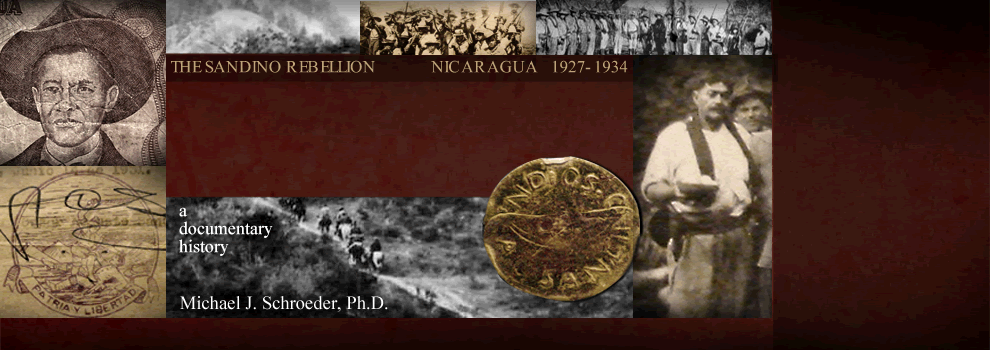|
T R A N
S C R I P
T I O N
Dario, Nicaragua
26 April, 1928.
|
From: |
Second Lieutenant AP Pefley,
U.S.M.C. |
|
To: |
The Commanding Officer |
|
Via: |
Commanding Officer, Dario |
|
Subject: |
Report of Patrol |
1. At 0600, April 23, 1928 I
with eight men left Dario to patrol the
region around San Isidro. At the river
"Viego" [Viejo] we turned off the Real
de la Cruz road toward San Isidro.
Traveled all day mapping the main road
and investigating side roads. Ambushed a
cross roads about four miles outside of
San Isidro at night. Entered San Isidro
early in the morning interviewing the
shop-keepers and many natives. All
reported that they had had no trouble
with bandits and were not molested. Left
for San Isidro after making a map of the
town, and proceeded toward Real de la
Cruz and Mangas. Unable to find road
indicated on map to these places;
natives all saying we were on the only
road to Real de la Cruz. Proceeded South
and mapped a short distance in both
directions on the Leon-Matagalpa road.
Entered a small village called Jicote
and camped for the night. Proceeded back
to Dario the following day arriving at
1600.
2. The natives in this
region seem very friendly especially
when treated properly and [ p. 2 ]
assured that the marines mean them no
harm. The store keepers in San Isidro
and the natives along the road all
reported that everything was quite
[quiet], that they were not molested by
bandits. There are many comparative
prosperous places along the Sebaco road
which bandits could loot were their
motive purely plunder.
3. Conclusions:- It seems as
though banditry in the San Isidro region
is more of the nature of a private feud.
On 13 April the bandits came to Sebaco
took a prisoner and robbed a store
(other stores were not bothered). That
night my patrol missed them by an hour.
From information from a reliable native,
this gang lives in the hills south of
Esteli. If their motive was solely
robbery, I do not believe they would
come all the way to such a poor place as
Sebaco.
The region around San Isidro is very
sparsely populated, water is scarce, and
the few natives living in this section
seem peaceful and are friendly when
given to understand that the marines are
in their country to protect them from
bandits.
The country is dry, very dusty and in
places rocky. There are few places
suitable for camps. The roads are lined
with thick underbrush. Very little of
the soil is cultivated.
Respectfully Submitted,
/s/ AR Pefley
2nd Lieut.
127/43A/20
|

